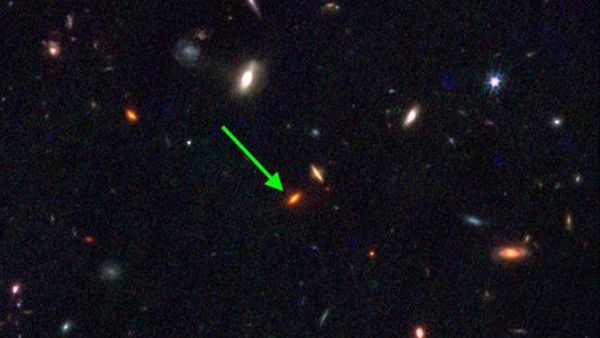Science
Related: About this forumJames Webb telescope finds ancient galaxy larger than our Milky Way, and it's threatening to upend cosmology
By Ben Turner( livescience.com ) published about 19 hours ago
Astronomers believe the first galaxies formed around giant halos of dark matter. But a newly discovered galaxy dating to roughly 13 billion years ago mysteriously appeared long before that process should have occurred.

JWST-7329: a rare massive galaxy that formed very early in the Universe.
JWST-7329: a rare massive galaxy that formed very early in the Universe. (Image credit: JWST NIRCAM)
The James Webb Space Telescope (JWST) has found a galaxy in the early universe that's so massive, it shouldn't exist, posing a "significant challenge" to the standard model of cosmology, according to the study authors.
The galaxy, called ZF-UDS-7329, contains more stars than the Milky Way, despite having formed only 800 million years into the universe's 13.8 billion-year life span. This means they were somehow born without dark matter seeding their formation, contrary to what the standard model of galaxy formation suggests.
How this could have happened is unclear, but much like previous JWST discoveries of other inexplicably massive galaxies in the early universe, it threatens to upend our understanding of how the first matter in the universe formed, or possibly even the standard model of cosmology itself. The researchers published their findings Feb. 14 in the journal Nature.
JWST-7329: a rare massive galaxy that formed very early in the Universe.
JWST-7329: a rare massive galaxy that formed very early in the Universe. (Image credit: JWST NIRCAM)
The James Webb Space Telescope (JWST) has found a galaxy in the early universe that's so massive, it shouldn't exist, posing a "significant challenge" to the standard model of cosmology, according to the study authors.
The galaxy, called ZF-UDS-7329, contains more stars than the Milky Way, despite having formed only 800 million years into the universe's 13.8 billion-year life span. This means they were somehow born without dark matter seeding their formation, contrary to what the standard model of galaxy formation suggests.
How this could have happened is unclear, but much like previous JWST discoveries of other inexplicably massive galaxies in the early universe, it threatens to upend our understanding of how the first matter in the universe formed, or possibly even the standard model of cosmology itself. The researchers published their findings Feb. 14 in the journal Nature.
More:
https://www.space.com/ancient-galaxy-upending-cosmology
Old Crank
(5,004 posts)The more we know we don't know.
brer cat
(26,531 posts)Oopsie Daisy
(4,566 posts)* and this ancient Milky Way galaxy is actually our Milky Way galaxy (or something).
2naSalit
(93,669 posts)We have it wrong about time/distance and it's all always existed in unison? Maybe distance is just distance and the further away something is from us is just far away and not any older or newer. Time is a construction we devised to relate to how we view life here... perhaps it doesn't apply anywhere else.
🤯
Javaman
(63,201 posts)scipan
(2,654 posts)I'm sure they thought of it but it's not addressed in the article.